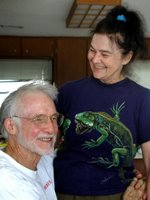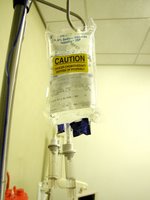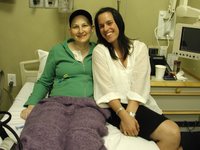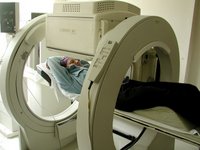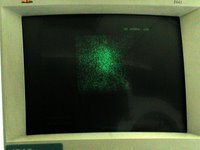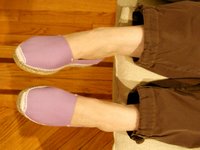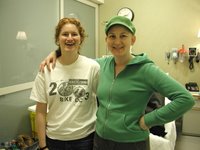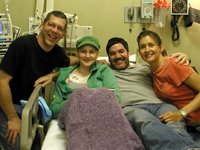People often ask me—ask both of us, actually—how we can endure everything we've been through. My standard reply is, "Yeah, it sucks....but it could be
so much worse."
Those aren't empty words for me. As the spouse and caregiver of someone battling cancer, I've met a lot of people along the way who have been touched by the disease: breast cancer yes, but also other forms of cancer. Breast cancer, when caught early, can be very treatable, and is even potentially curable (although you never know if you're "cured" until you die of something else.) But there are other cancers that are much harder to detect, can be far more aggressive, and can attack the body in more distressing ways.
A digression:
My father, Barry, was diagnosed with a "heart murmur" in his 30s.
It changed his life.
He had a faulty mitral valve, which meant that his heart couldn't pump his blood efficiently. An avid flyer (he learned in the army on the GI bill, and actually served, though behind a desk, in the Korean War), he had courted my mom in his plane; suddenly he was grounded. He had to curtail his physical activity. His doctors told him that he had to "wait until science caught up" with his heart problem; in the meantime, he was prescribed a restricted, bland, low-salt diet to keep fluids from building up in his body. For a period of some of those years, his heart grew so enlarged from overworking, you could literally see it pumping through his chest.
Finally, in the mid-1970s, my dad's doctors felt modern medicine had advanced to the degree that they could do something more concrete for him. And in 1975, at the ripe old age of 43, he underwent open-heart surgery to have an artificial mitral valve implanted in his heart. Though it was a risky operation requiring a lengthy hospital stay (we all have memories of my mom keeping our chins up as we celebrated Christmas together without my dad for the first time, then piled into the VW van for the hour-long drive to the hospital to see him during his recovery), he gutted it out and refused to let it break his spirit.
He was on dozens of medications for the rest of his life. I mean, his watch would literally beep four or five times a day, and he'd announce, "gotta take a pill", and he'd pop out for a moment to do so. A decade after his first surgery, he had a second operation to replace his original valve; it was still working fine, but the Teflon coating on it was breaking off into his blood stream and causing complications.
Barry handled it all with an incredibly resilient and stoic nature that is one of his greatest gifts to me (along with an incredible curiosity, a fierce independent streak, and a host of other traits). He felt he'd bought unexpected time with his two surgeries, and never once complained of the life he might have had if his ticker hadn't been so uncooperative. As the years went on, he stubbornly refused to succumb to the disease: he went for long jogs most days and he played tennis three days a week. At our annual trips to the ocean in North Carolina, he'd body-surf and throw a frisbee or softball with us. Despite the two surgeries under his belt, he kept himself in better shape than a lot of men ten years his junior.
Yet he also resigned himself to the fact that one day, his heart would fail him. In this past decade he developed the symptoms of congestive heart failure and began to slow down a bit. The medications increased; he began to make fewer long trips, afeared of being too far from a decent hospital; his physical activity slowed (although it was no less frequent!) And there was an unspoken reality acknowledged in our family that one of these days, probably on the tennis court he still played on three days a week, my father's heart would give out.
And he was comfortable with that. I think he'd
truly made his peace with it. There are, after all, worse ways to go than being out in the open air, doing something you love, and fighting keep your space in this world. We all felt, him included, that this would be the ending he deserved.
What he didn't know—what none of us
could know—was that an aggressive, invasive cancerous tumor was forming and growing in his brain.
It started with unusual things he'd say; he'd use the wrong word in a phrase, or not finish a sentence he'd started. He'd occasionally done this in the past, the kind of thing you'd attribute to "old age", but suddenly it became very noticeable in November 2004. Over the next couple of months, my mother became more and more worried about him, as his behavior fell increasingly out of character. Finally in March 2005, she took him to the hospital to be examined, and the tumor was discovered.
What followed was a flurry of activity: family members flew home; tests were performed; treatment options were considered, agreed upon, attempted and then abandoned for lack of effect. Throughout it all, my father, always the most passionately intellectual man I've ever met, had trouble communicating. The cancer was rapidly eating away at his cognitive function, and his ability to communicate with us was severely compromised. We're all fairly certain he knew what was going on, but for us to discuss it with him was like a guessing game. Nonetheless, he kept up his sense of humor and fighting spirit straight through to the end.
So while he had prepared for most of his life for his
body to give out on him—
and had made his peace with that eventuality—in the end it was his
mind that was stolen away first. For a man of his nature, this was a far worse insult.
The time elapsed from his initial diagnosis last March, to his eventual passing one year ago today, was less than two months. It took
two months for a fucking brain tumor to bring down what thirty years of heart problems couldn't.
So quick. So arbitrary. So devastating.
Having gone through that agonizing experience together has helped to make both Jody and I more circumspect about what we're dealing with. Of course it sucks. Of course it drains us, makes us want to scream at the Gods or check out of the world altogether sometimes. But the fact is, our picture could be a lot bleaker than it is.
Words typed into a computer could never express everything my father meant to me. Suffice to say that on this day, I think about our good times and chuckle to myself; I think about all he gave to me and hope I can live up to his legacy; I miss him and I mourn him.
